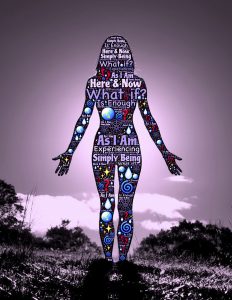“This above all: to thine own self be true,
And it must follow, as the night the day,
Thou canst not then be false to any man …”
-Polonius to Laertes (Hamlet, Act 1, Scene 3)

‘Just be yourself’ – One of the most confusing things we tell ourselves and each other! In my youth, I cheered this idea from Western individual capitalism – an idea for the privileged. I thought is was an admirable and simple way to exist as a human. As I grow older, I find it not just a complex and confusing ideal, but cruel and dangerous.
You, like me, may have been part of some sort of tribe of belonging that had a habit of telling us to ‘just be yourself’ … However, if you observe closely, it is mainly when we stand up or resist or speak out about something they agree with – a form of praise. When our words and actions fail these tribal ideological constructs, the sentiment of ‘Just be yourself’ quickly dissipates. It is often replaced with hostility and comments like, ‘You have changed’ or ‘That doesn’t sound like you’. ‘Just be yourself’, I have found, can be another phrase that compliments conformity.
I also stand guilty as charged of throwing this phrase around carelessly. How many times have I said this to an individual who was questioning and processing their sense of self with me? In the past, I gave little thought of the price that this person may pay if they followed my sloppy advice. Advice given to them from a position of my own blind privilege. I shudder as I think back to my youthful arrogance, using my power and platform to propagate this lofty and confusing ideal. It is only in recent years that I have become acutely aware of how ‘just be yourself’ can not only be dangerous, but devastating for individuals whose sense of self or identity has been rejected and shunned by their family or community.
If you live as part of a dominant Western capitalistic culture, this notion has probably dogged you since you can remember. Like oxygen, the idea is inescapable – ‘just be yourself’. And like a blind herd we attempt to heed its call – going down every path of existential angst and despair. We literally exhaust ourselves trying to be ourselves! The problem with ‘just be yourself’ is that in order to BE yourself, you have to KNOW yourself … and to know yourself is a lifelong quest. Our concept of self is the sum of the stories of what other people, as well as our culture and history, have told us we are. It takes a lot of life, a lot of questions, a lot of listening, and a good dose of humility, and vulnerability, to begin to question these stories. Perhaps one of the first questions to ask is, “Am I ok with the advice – ‘Just be yourself’?”
I can no longer heed this notion. It is not advice I will be giving. My questions have changed. To assist me in telling the stories of who I am, I now have one very important question to ask: ‘What do I value?’ I have found this so incredibly helpful. Let me give you an example:
I value kindness. So does that mean that by ‘just being myself’ I am kind? Not at all! I have many moments of incongruence when what I value and how I behave or the things that come out of my mouth do not match. This shows me that kindness is not inherent. Rather, it is something I become skilled in harnessing. When we externalise both good and bad traits, we create hope! Just as I can become skilled at harnessing kindness, I can learn to discard for example, shame, or whatever trait negatively impacts my life.
When our mantra changes from ‘Just be Yourself’ to ‘What do I value?’, we begin to construct our life and stories in ways that align themselves to our hopes and dreams. Kindness as a value very quickly highlights any discrepancy of how I live my life. The value of kindness begins to weave itself into my life stories. I begin to narrate my stories and my actions from this value. Richard Rohr says that we do not think (or believe) ourselves into a new way of living (our preferred stories). We live ourselves into a new way of thinking. Values become like a compass – giving us direction and insight.
So next time you are glibly thrown the line, ‘Just be Yourself’, stop. Pause. Ask, “When you say that, what do you mean?” Most of the time, we don’t really know what we mean. Perhaps that person has seen a value from which you live your life that resonates with them. Discovering and discussing this can move us beyond annoying cliches to meaningful conversations and insights.
For you, dear reader, may you take time to consider what in life you really value. May these values be a light for your path and central to the stories you tell yourself about who you are.
“Narratives are the primary way in which we make sense of our lives, as opposed to, for example schema, cognition, beliefs, constructs. Definition of narrative include the important element of giving meaning to events and experiences over time by connecting them as a developing, continuing story.”
– Jacqui Stedmon –
